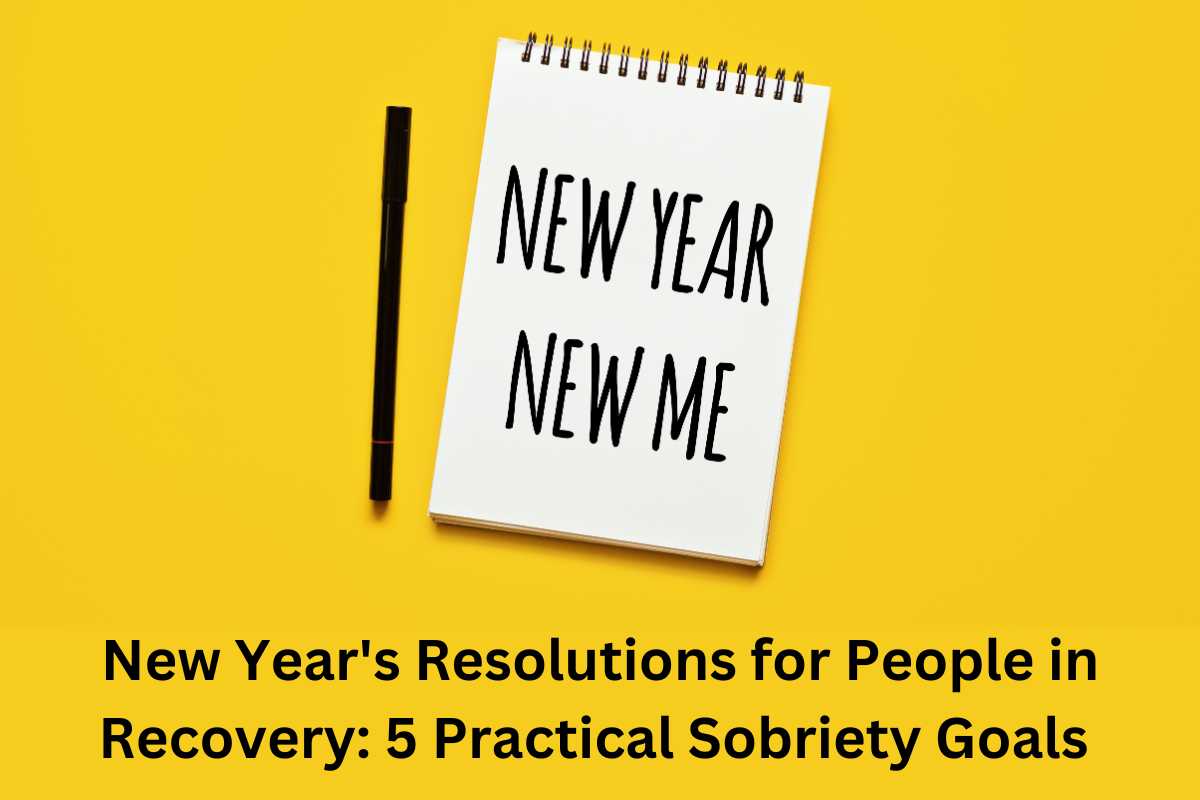By: Design for Change
Categories:
New Year’s Resolutions for People in Recovery: 5 Practical Sobriety Goals
You are here: If you’re in recovery, you’ve already learned that maintaining sobriety involves more than raw willpower. You need a plan, support, and the right mindset. Making New Year’s resolutions is a great way to begin, but keeping them requires a lot of effort and determination. Relapse prevention begins with setting sobriety goals that provide purpose and direction.
If you’re in recovery, you’ve already learned that maintaining sobriety involves more than raw willpower. You need a plan, support, and the right mindset. Making New Year’s resolutions is a great way to begin, but keeping them requires a lot of effort and determination. Relapse prevention begins with setting sobriety goals that provide purpose and direction.
Do you have clear, realistic, and achievable sobriety goals for the coming year? If not, we have a few useful suggestions to help you get started.
Why It’s Important to Set Sobriety Goals
Without a roadmap, you can’t reach the substance-free lifestyle you desire. During difficult times, you need a plan to guide you and keep you on track. The path can be littered with temptations, triggers, and other challenges that you must detour around. To reach your goals, you must remain focused on your objectives.
As well as keeping you focused and on track, sobriety goals allow you to monitor your progress. With that in mind, here are a few ideas to help you set measurable goals.
Defining Your Personal Sobriety Goals
Your first step in setting sobriety goals is understanding what sobriety means to you on a personal level. You can begin by assessing your situation and identifying behaviors you want to change. Everyone’s path to sobriety is different, so you must set goals that align with your situation and objectives. With the right strategies, long-term success is within your reach.
The second step in defining your personal sobriety goals is to recognize triggers and have a strategy for managing them. Everyone’s triggers are different, so it’s important to know what your personal triggers may be. For instance, do emotional upheavals lead you to use addictive substances as a coping tool? Or do certain places bring back memories of past substance use?
Throughout your sobriety journey, you will face many obstacles that require dedication, strength, and resilience to overcome. However, with a realistic plan, you will succeed. Knowing your triggers allows you to develop coping mechanisms that reinforce your determination to reach your sobriety goals.
What Are Realistic Milestones in Recovery?
Realistic milestones are goals that keep you grounded without causing undue stress. You want to set goals that are not only rewarding but are attainable. Here are a few examples of clear, actionable milestones for your recovery journey:
- Maintaining a substance-free daily routine
- Engaging with support groups to gain encouragement from peers
- Reevaluating and refining your goals to adapt to personal growth
- Celebrating your first year of sobriety reconfirms your commitment
Your goals for sobriety should represent your desire to have healthier relationships, pursue your career or educational ambitions, and enjoy a rewarding, sober lifestyle.
Examples of Achievable Sobriety Goals
Setting sobriety goals is more than creating a checklist. You are constructing a framework that will move you forward in achieving long-term sobriety. You should be specific in your goals and measure your progress. Set realistic goals to avoid burnout and maintain motivation. You can also create deadlines for each milestone to help you stay focused and avoid procrastination.
To help you get started on your sobriety goals, here are 5 examples of proven goals to help you maintain substance-free living:
- Health and wellness – Incorporate exercise into your routine at least 3 times a week.
- Relationships – Check in once a week with a supportive friend or family member.
- Personal Development – Read books or other media that focus on self-improvement and recovery.
- Career/Education – Attend workshops or courses related to career growth or personal interests.
- Community Service – Get involved in your community and build sober relationships by volunteering.
You can achieve these goals by journaling, exercising, learning new hobbies, attending support groups, and reaching out for help and support when needed.
By following these examples, you ensure that you are structuring a life that you will value and enjoy, free from the burden of substance use.
What Is a Sobriety Goal Tracker?
Sobriety goal trackers and apps help many people set and track their sobriety milestones. They also serve as a convenient support system. A well-maintained tracker system gives you access to your daily progress and triumphs. It’s a great way to stay motivated and focused on the end goal.
Although there are a myriad of goal trackers and apps available, the top recommended apps include Sobriety Counter, I Am Sober, and Sober Grid. When things get tough or overwhelming, a sobriety app can help keep you on track.
Remember, setting sobriety goals is an effective method for guiding you through your recovery process. Focus on small, incremental goals to keep from feeling overwhelmed. A goal tracker app is a great way to receive reminders, motivational prompts, and encouragement while pursuing your goals.
The First Step to Sobriety is Treatment at Design for Change Recovery
If you’re struggling to control your substance use, professional treatment is your best option for overcoming a powerful addiction. Our services include evidence-based therapies that promote recovery across the entire continuum of care. Our treatment advisors will help you develop a customized treatment plan that aligns with your unique situation.
Design for Change provides high-quality, JCAHO-accredited treatment that ensures the utmost in client safety and care. We are in-network with major insurance companies to provide you with the affordable, effective level of treatment you need and deserve.
Contact our Lancaster, CA facility by phone, email, or online to learn more about how we can help you enjoy many years of sobriety.
Sources:
ncbi.nlm.nih.gov/ – Goal Setting and Monitoring with Alcohol and Other Drug Use Disorders: Principles and Practices
healthline.com/ – The Best Alcohol Addiction Recovery Apps


